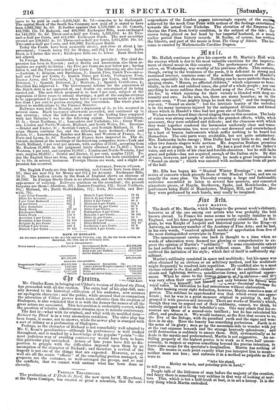i u 2rto.
JOHN MARTIN.
The death of Mr. Martin, which belongs to the present week's obituary, bereaves us of the one among our artists who was probably the best known abroad. In France his name seems to be equally familiar as in England, and his fame perhaps more permanently established. In Bel- gium, he was Knight of Leopold and historical painter to the King-at Antwerp, an honorary member of the Academy of Fine Arts ; and he had, in his own words, "received splendid marks of approbation from five of the most distinguished sovereigns in Europe." The announeement carries one back in thought to a time when no words of admiration were deemed too glowing or comprehensive to ex- press the opinion of Martin's "sublimity." To some considerable extent he had outlived his renown ' • and not without cause. He had certainly outlived the, imitation of his style ; which fact of itself is sufficiently sig-
nificant. '
Martin's sublimity consisted in space and multitude; but his space was often obtained by an obvious or an arbitrary method, and his multitude might frequently be resolved into repetition. He confided also to a most vicious excess in the first self-evident elements of the sublime-thunder- clouds and lightning, meteura, antediluvian forms, and spiritual appear- ances. When he came to the humNerem, Ntrictures--and was very often their esse....6--0 L„,.4f"'""- becatbeumhiscjii 1,69yiaa.ntrapwernze: royal-rotellnint' heiresecullioni hme laLa."4-7.ad min-uteness without elaboration. After making every right deduction, however, Martin remains a man of genius. The sublime he apprehended was that which every one appre- hends ; but he was in a great measure original in painting it, and he grasped it with passion and intensity. There are works of Martin's which, though they can be argued out of their sublimity, cannot, we think, be entirely stripper of it to 'the beholder's eye. One may admit that his re- sources are those of a second-rate intellect ; but he has calculated his effect, and produces it. We would instance, as the first that occurs to us, the Eve of the Deluge, with its paradisal earth and the signs and won- ders in its sky. Here the beauty has something portentous. Earth is at the acme of its glory ; men go up the mountain-side to wonder with joy at the vast expanse beneath and the strange heavenly splendours; and swift destruction is suddenly to amaze them. Still, systematically as he deals in the mystic and preternatural, Martin is not suggestive. An un- failing property of the highest genius is to work as it were half uncon- sciously, to suggest or express something beyond the precise intention, to leave some scope for the spectator's imagination. Martin has nothing of this. He means in each point exactly what you interpret him to mean- neither more nor less ; and enforces it in a method as palpable as if ho were to
" take his stand Motley on back, and pointing-pole in hand," to tell you so.
People talk of the littleness of man before the majesty of the creation, and fancy there is something very sublime in that way of looking at mat- ters. This, which is but a half-truth at best, is in art a heresy. It is the very thing which Martin embodied.


























 Previous page
Previous page